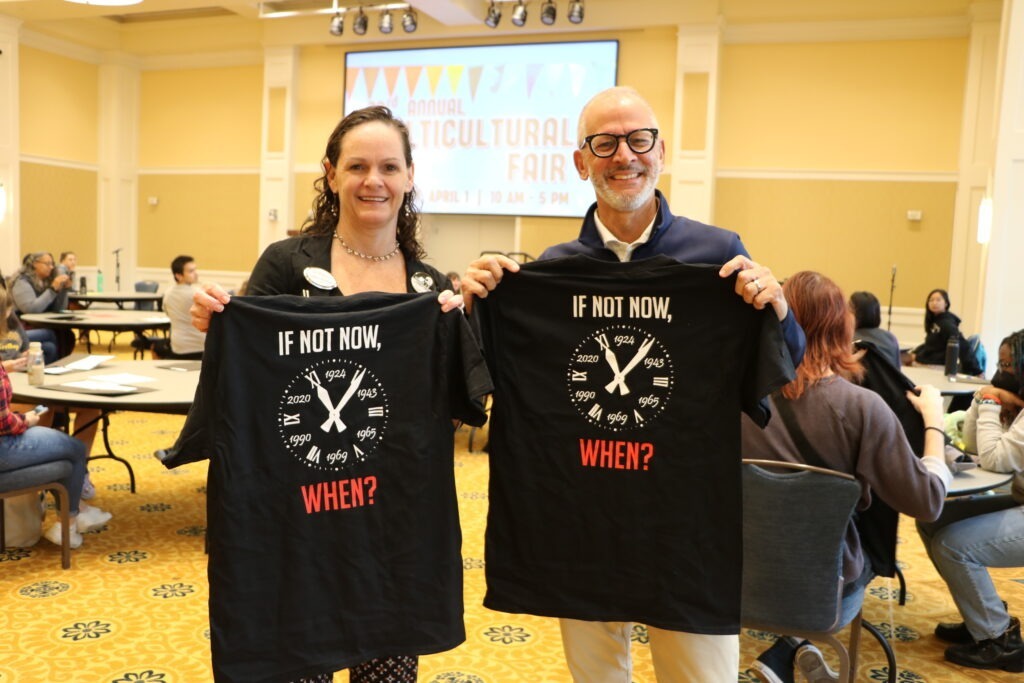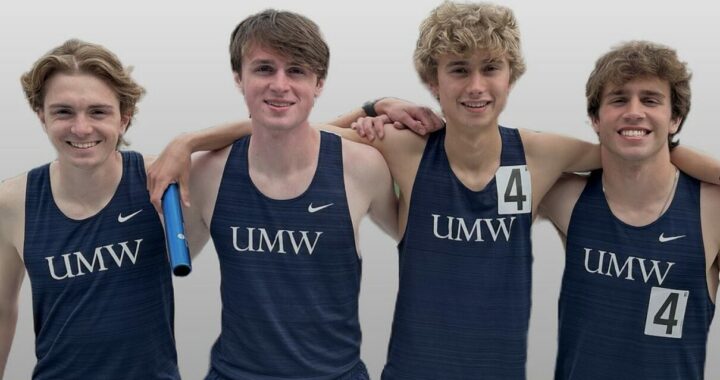The Social Justice and Leadership Summit is an important event for UMW, advocating for positive change
5 min read
UMW President Troy Paino (right) and vice president for student affairs Juliette Landphair (left) pose at the JFMC Social Justice and Leadership Summit with t-shirts. | Dr. Marion Sanford, JFMC
by GWEN HARRISON
Staff Writer
Since 2016, the University of Mary Washington has been putting on the Social Justice and Leadership Summit, an annual event that brings awareness to social justice issues and the paths that we as a community can take to respond to them. Open to UMW, high school and community college students in the Fredericksburg area, the event allows attendees to engage with a variety of different speakers who bring a deep insight to different aspects of social justice, and it promotes impactful conversations between everyone.
Originally scheduled for March 2022, this year’s Social Justice and Leadership Summit had to be postponed due to inclement weather. Rather than simply canceling the event, the Summit subcommittee and Chris Williams, the assistant director of the James Farmer Multicultural Center, elected to hold the event on Sept. 17, 2022, as well as continue with the regularly scheduled summit in March 2023. This is the first Summit to be held in person since 2019.
This fall’s guest speakers included UMW faculty members as well as a special guest, the Honorable Judge Arthur Burnett Sr. Having events like this is essential to helping students and faculty learn and grow, and they are especially important at predominantly white institutions, as they allow everyone to share knowledge and broaden their perspectives.
The Summit has a great importance to the students and faculty of UMW. “The Social Justice and Leadership Summit is important because it creates an opportunity for students to become aware of these social issues, and to create a plan of action,” said Kate Ramirez, a senior marketing major, first generation college student and the vice president of the Latino Student Association. “This is an opportunity to motivate students to work together while breaking down cultural barriers.”
Having a variety of different speakers helps expand the conversations around social justice. When people think about social justice, they tend to minimize what they talk about, usually reducing the conversation to simply ending racism and sexism, but rarely do they dive deeper and think about social justice through different lenses to focus on more specific aspects of it.
The Social Justice and Leadership Summit allows everyone to discover impactful paths towards progress. Alongside Burnett, Mary Bauer, the executive director of the American Civil Liberties Union of Virginia, led an incredible session about human rights. She spoke about the pressing issues that are on the Virginia ballots this November, such as abortion and LGBTQ+ rights, as well as actions that people can take in addition to voting.
Smaller sessions in the summit included “Can We Save (and Enrich) Democracy? The Prospect of Authoritarianism in the United States and What We Might Do to Fight Back” with Dr. Eric Bonds, “Analyzing How Housing Injustice Has Led to Gradual Inequality in the U.S.” with Dr. Christine Henry and more.
“Social Justice workshops help us to better understand the difference between fairness and inequality across distinct aspects,” said Rebecca Cruz Briones, a junior political science and Spanish double major with a minor in social justice. “It informs us about our rights as U.S. citizens to improve our country through the means of democracy.”
Creating space for everyone is one of the most important aspects of the Summit. Every year, it allows people to be exactly who they are, no matter how they identify and to feel included in all conversations. When everyone has a seat at the table, the conversations become more productive and impactful.
Luisa Restrepo, a junior cyber security major with a minor in computer science and the president of the Latino Student Association, believes that the Social Justice and Leadership Summit is a necessity for college campuses. “As a first generation Latina in college I believe that having events like this one is extremely important to educate and diversify students’ and the general public’s knowledge on inclusivity and equity in higher education,” she said. “Having summits like this should be a requirement at predominately white institutions so that instructors, faculty, and students understand more about issues and current events that occurred or are occurring in BIPOC communities.” Black, Indigenous and people of color (BIPOC) are oftentimes not included in the serious conversations at predominately white institutions, and the Summit brings a new opportunity to highlight their perspectives.
Williams believes that the postponement of the summit was a blessing in disguise. With the recent rise of political and social activity, such as the Supreme Court’s decision to overturn Roe v. Wade, the ongoing pandemic and criminal justice issues, “social justice has come to the forefront even more so after this summer,” said Williams. “Students on campus feel that this is a great time to have an event like this because these social justice issues need to be addressed and UMW students and high school and community college students in the greater Fredericksburg area want to play a role in trying to find solutions.”
Had the event been held in the spring, students would have had the opportunity to engage with Qasim Rashid, an activist, attorney and author who ran for the Virginia State Senate in 2019. Unfortunately, Rashid was unable to attend the summit this fall, but Burnett filled his spot. “Having someone like him at the summit is going to be profound for the students in attendance,” said Williams. “We’re talking about an individual who is responsible for changing how the law works for the betterment of every citizen in this nation. For the past fifty to sixty years, he’s had a direct impact and influence on how civil rights law is dictated in this country.”
With midterm elections approaching, young people registering to vote is essential, which makes this the perfect time to have a speaker like Burnett at Mary Washington to motivate students who care about social justice and civil rights. The need for the younger generations to become politically and socially aware grows every day, and the Summit arms them with knowledge they can put into action at the polls this November.
Gwen Harrison served on the subcommittee for the Social Justice and Leadership Summit.











